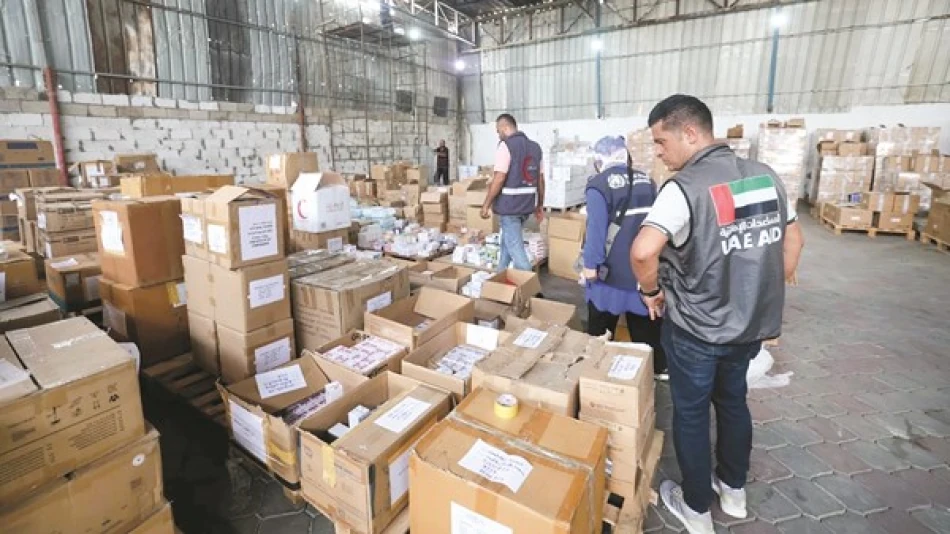
UAE Boosts Gaza's Healthcare with Essential Medications and Medical Supplies
UAE Delivers Critical Medical Lifeline to Gaza as Healthcare System Teeters on Collapse
The United Arab Emirates has delivered a crucial shipment of medicines and medical supplies to Gaza's crumbling healthcare infrastructure through its "Chivalrous Knight 3" operation, working alongside the World Health Organization to prevent total system collapse. The delivery comes as hospitals face critical shortages of essential medications and supplies, highlighting both the severity of Gaza's medical crisis and the UAE's expanding role as a regional humanitarian powerhouse.
Emergency Medical Supplies Reach Khan Younis Hospital
The Nasser Medical Complex in Khan Younis received multiple trucks carrying diverse medical supplies and essential medications as part of the coordinated relief effort. The timing proved critical, as the hospital was experiencing severe medicine shortages and acute supply deficits that threatened its ability to handle emergency cases.
Sherif Al-Neirab, media director for the "Chivalrous Knight 3" operation in Gaza, emphasized that the UAE continues delivering medical aid specifically to halt the collapse of healthcare infrastructure and alleviate suffering among hospitals and patients throughout the territory.
WHO Coordination Ensures Strategic Distribution
Dr. Heba Al-Najjar, coordinator of emergency medical teams for the World Health Organization, confirmed that the organization delivered a medicine shipment to the Palestinian Ministry of Health containing all necessary categories unavailable in Gaza's health facilities. The WHO's involvement signals international recognition of the crisis's severity and the need for systematic, professional distribution networks.
Ibrahim Al-Farra, responsible for receiving external medical aid at Gaza's Ministry of Health, described the UAE's medical supplies as "a lifeline for all patients," noting that continued assistance revitalizes hospitals and helps save patients and wounded individuals.
Expanding Air Operations Demonstrate Logistical Innovation
The UAE executed its 71st airdrop operation under the "Birds of Goodness" initiative, part of the broader "Chivalrous Knight 3" operation. This coordinated effort involved Jordan, Germany, Italy, Belgium, and France, showcasing the UAE's ability to build international coalitions for humanitarian purposes.
The latest airdrop included essential food supplies prepared with support from Emirati charitable institutions and organizations. With this operation, the UAE's total airborne aid delivery reached over 3,956 tons of diverse assistance, including food and necessary supplies.
Multi-Modal Delivery Strategy Overcomes Access Restrictions
The UAE's approach—utilizing land, sea, and air delivery methods—represents a sophisticated response to access limitations affecting traditional border crossings. This strategy demonstrates how regional powers can leverage diverse logistical capabilities to maintain humanitarian flows despite political and security constraints.
Palestinian Officials Recognize Strategic Partnership
Palestinian officials praised the UAE's comprehensive support efforts, acknowledging that Emirati assistance represents a fundamental pillar in efforts to alleviate humanitarian suffering and strengthen community resilience amid imposed restrictions on supply access through border crossings.
Dr. Mohammed Al-Shalalda, former Palestinian Minister of Justice, expressed profound appreciation for UAE efforts to deliver humanitarian aid under harsh conditions caused by ongoing conflict. He emphasized that any initiative to reduce Palestinian suffering deserves recognition, especially given acute shortages of food, medicine, water, and fuel.
Building Arab Solidarity Through Action
Abdul Fattah Dola, spokesman for the Fatah movement, highlighted the UAE's leading humanitarian role, noting that Emirati support for Gaza's population has never ceased since conflict erupted in October 2023. He pointed to the establishment of a field hospital within Gaza and the evacuation of patients and children with cancer for treatment in UAE hospitals as examples of comprehensive engagement.
Major General Habes Al-Sharuf, director of the Palestine Institute for National Security, emphasized that UAE efforts to deliver aid through land, air, and sea represent a critically important humanitarian message amid continuing suffering and escalating humanitarian catastrophe.
Regional Implications for Humanitarian Diplomacy
The UAE's sustained Gaza operations reflect a broader strategic approach to regional influence through humanitarian leadership. Unlike traditional diplomatic or military interventions, this model builds soft power through practical assistance that directly impacts civilian populations.
The coordination with international partners, including European nations and UN agencies, positions the UAE as a bridge between Arab solidarity and global humanitarian frameworks. This approach could serve as a template for future crisis responses in the region, where traditional political solutions face deadlock but humanitarian needs remain urgent.
The operation's scale and consistency—71 airdrops and thousands of tons of aid—demonstrate institutional capacity that extends beyond symbolic gestures to meaningful impact on ground conditions. For other Gulf states and regional powers, the UAE's model offers insights into how sustained humanitarian engagement can maintain relevance and influence during protracted conflicts.
Most Viewed News

 Layla Al Mansoori
Layla Al Mansoori






